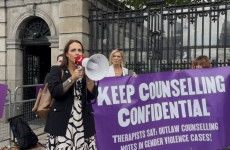Politics
Protesters Demand Ban on Counselling Notes in Assault Cases

A protest took place outside Leinster House today, where campaigners called for an outright ban on using a person’s counselling notes as evidence in sexual assault court cases. The demonstration coincided with the Oireachtas Justice Committee session focused on pre-legislative scrutiny of the Criminal Law and Civil Law (Miscellaneous Provisions) Bill 2025. This bill aims to tighten regulations around the use of counselling notes, although judges will still retain the authority to determine their admissibility in court.
Survivors of sexual abuse and their advocates assert that government proposals do not go far enough. They demand a complete prohibition on the practice, arguing that it compromises the confidentiality of therapy sessions and deters victims from seeking necessary support.
During the committee session, survivor Hazel Behan was the only survivor scheduled to speak. Her speaking time was limited to less than five minutes, a situation that TD Ruth Coppinger described as “completely insufficient and unfair.” Coppinger emphasized the need for more extensive discussions to incorporate the experiences of additional survivors and therapists into the legislative process.
Before her appearance, Behan addressed reporters, expressing her frustration with the government’s proposed changes. “What happens in a therapy room with me and my therapist is none of your business,” she stated emphatically. “I will say it again and again—what I say to my counsellor is none of your business, and it’s certainly none of the business of the person who I believe harmed me.” She urged the government to implement a total ban on the use of counselling notes in court cases.
Therapist Barbara Kelly also spoke at the protest, highlighting the unity among therapists in Ireland who support a full ban on this practice. “I just can’t believe that we’re standing here again, having this same campaign over and over,” Kelly said. “What else do we have to do to show Jim O’Callaghan and this government that we want a complete ban, not amendments? They fall way too short.” Her remarks resonated with many in attendance who share a sense of urgency regarding this issue.
The protest reflects a growing movement among survivors and mental health professionals advocating for legislative changes that protect the integrity of therapeutic relationships. They argue that therapeutic confidentiality is essential for victims to share their experiences openly and receive the support they need.
As the legislative process continues, advocates remain vigilant, pushing for reforms that prioritize the rights and privacy of victims while ensuring that justice is served. The outcome of the committee’s deliberations could significantly impact how sexual assault cases are prosecuted and how survivors engage with mental health services in the future.
-

 Top Stories3 months ago
Top Stories3 months agoTributes Surge for 9-Year-Old Leon Briody After Cancer Battle
-

 Entertainment4 months ago
Entertainment4 months agoAimee Osbourne Joins Family for Emotional Tribute to Ozzy
-

 Politics4 months ago
Politics4 months agoDanny Healy-Rae Considers Complaint After Altercation with Garda
-

 Top Stories4 months ago
Top Stories4 months agoIreland Enjoys Summer Heat as Hurricane Erin Approaches Atlantic
-

 World5 months ago
World5 months agoHawaii Commemorates 80 Years Since Hiroshima Bombing with Ceremony
-

 Top Stories3 months ago
Top Stories3 months agoNewcastle West Woman Patricia Foley Found Safe After Urgent Search
-

 Top Stories5 months ago
Top Stories5 months agoFianna Fáil TDs Urgently Consider Maire Geoghegan-Quinn for Presidency
-

 World5 months ago
World5 months agoCouple Convicted of Murdering Two-Year-Old Grandson in Wales
-

 World5 months ago
World5 months agoGaza Aid Distribution Tragedy: 20 Killed Amid Ongoing Violence
-

 World5 months ago
World5 months agoAristocrat Constance Marten and Partner Convicted of Infant Murder
-

 Top Stories4 months ago
Top Stories4 months agoClimbing Errigal: A Must-Do Summer Adventure in Donegal
-

 Top Stories4 months ago
Top Stories4 months agoHike Donegal’s Errigal Mountain NOW for Unforgettable Summer Views









